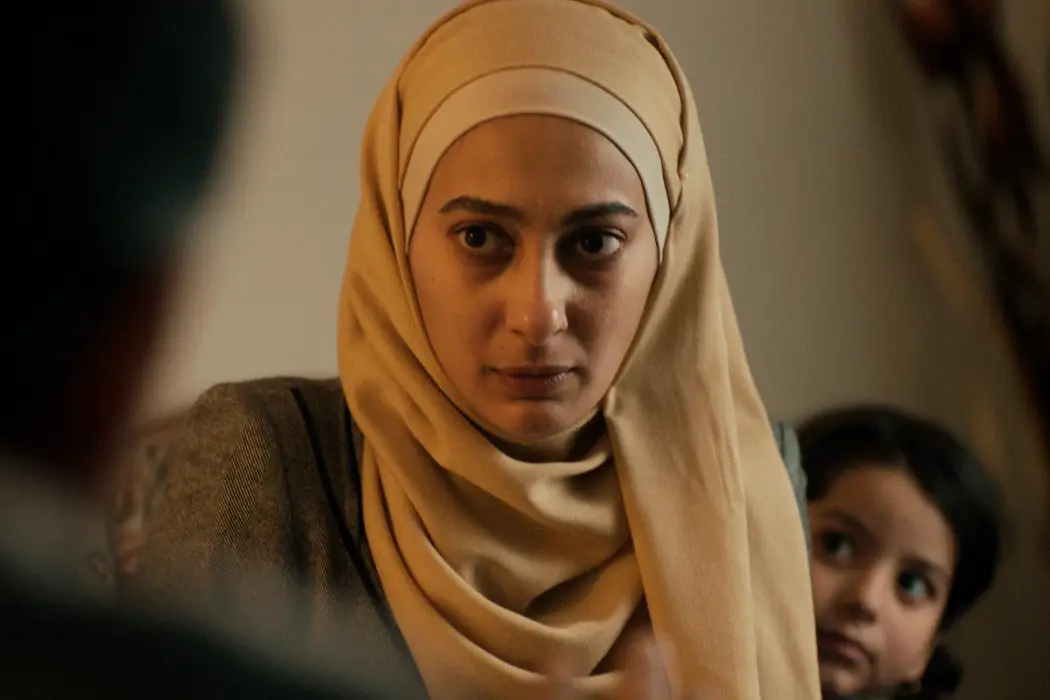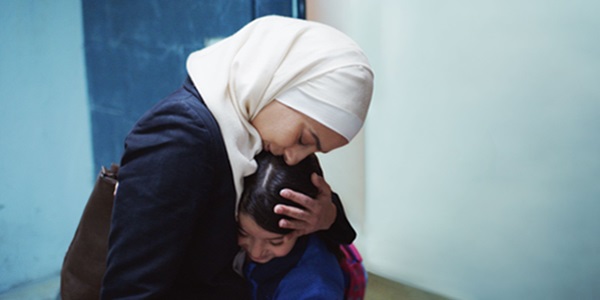INSHALLAH A BOY: A Woman In Trouble

Lee Jutton has directed short films starring a killer toaster,…
The debut feature from director Amjad Al Rasheed and the first Jordanian film to ever screen at the Cannes Film Festival, Inshallah A Boy is a compelling, character-driven drama chronicling a young widow’s fight to secure what is rightfully hers in a society that bestows more rights upon an unborn boy than a living woman. She walks a delicate tightrope, trying to maintain her faith while still holding firm against the men who would use that faith to keep her securely under their thumbs. Al Rasheed, who co-wrote the script with Rula Nasser and Delphine Agut, based the film on a real-life scenario involving one of his close relatives, making Inshallah a Boy all the more impactful in both the authenticity and the absurdity of the situation our heroine finds herself in.
Unequal Under the Law
The life of thirtysomething nurse Nawal (Palestinian actress Mouna Hawa, in a stunning, sympathetic performance) is thrown into upheaval with the abrupt death of her husband, with whom she had been trying for a second child. A strong, smart woman who is determined to continue working and providing a stable home for her young daughter, Nora (Seleena Rababah), Nawal is further shocked to learn that since her husband had no money saved, the little he left behind—mainly, their apartment, which she helped pay for with her salary—must be split among his living heirs. According to the Islamic law that has governed Jordan for a millennium, since Nawal has only a daughter and no son, that means her brother-in-law Rifqi (Haitham Omari) has just as much a right to the apartment as she does…and he wants to sell it to replenish his own coffers.

Nawal needs a son to claim full rights to the inheritance; even an unborn child that might be male has more of a legitimate claim than she and Nora do on their own. So, she tells everyone she is pregnant, giving her at least nine months to figure out her next move. But Rifqi demands official proof of the pregnancy, and Nawal finds herself throwing all caution to the wind to keep the masquerade going. The more stubborn Nawal is in the face of men telling her how to live her life and raise her daughter, the less sympathy she gets for her situation, and the more likely it becomes that Rifqi will not only seize her apartment but also custody of Nora.
When Lauren (Yumna Marwan), one of the relatives of the elderly woman Nawal nurses, finds herself pregnant with an unwanted baby, the two of them conspire to help each other out of their respective predicaments. For Lauren, having a baby represents a chain tying her to her philandering husband; for Nawal, a baby represents the freedom to dictate her own future. These two women could not be more different on the surface, but deep down, they are all too similar in their rejection of the laws that govern their lives.

No More Fight Left in Me
The character of Nawal is a multifaceted marvel of a woman brought to vivid life on screen by Hawa. She is a devout Muslim who follows traditions such as wearing the hijab, but she also insists on continuing to go to work instead of remaining shut up inside for months to mourn her husband as custom decrees. She contemplates using a dating app for a one-night stand to get herself pregnant, but as soon as a prospective partner asks her for a selfie without her hijab, she shuts her phone. Nawal believes abortion is a sin, but she is also willing to help Lauren secure one in exchange for Lauren’s help in faking a pregnancy test result; after all, Lauren tells Nawal, isn’t it also a sin for Rifqi to force you and your daughter out of your house? Throughout the film, Nawal is forced to examine her faith and determine how many lines she is willing to cross in her ongoing resistance. Needless to say, anxiety runs like an electric current throughout the film as her actions grow increasingly reckless in her desperation.
Inshallah A Boy presents life in Jordan’s capital of Amman as one that reflects the contradictions inherent in Nawal’s person, in which the tug of war between age-old beliefs and modern mores is ever-present in everyday life—especially if you’re a woman. Nawal is supposed to be home before dark due to the conditions of her mourning period, but her job requires long hours that aren’t amenable to such requirements; when she gets a ride from a male colleague to make it home in time, Rifqi questions her fitness as a mother. Meanwhile, the wealthy family that Nawal works for appears to not be so strictly governed by traditions—the women eschew the hijab for chic hairstyles—yet Lauren feels incapable of leaving her cheating husband or getting the abortion she desires; she has even less control over her own life and choices than Nawal and faces just as severe of consequences if she rebels.

In a sequence that recurs throughout the film, we see Nawal walking home past a man who repeatedly catcalls her, claiming that he wishes he were the purse she’s holding under her arm. For the majority of the film, she silently and speedily walks past without looking at him; by the film’s final act, she has had enough and walks over to whack him over the head with her purse. It might seem like a small action in the grand scheme of things, but it perfectly symbolizes the journey Nawal goes on during the film; she no longer cares about what the patriarchy thinks is right, only what she thinks is right according to her personal moral code. As a result, this small action manages to feel monumental. Such is the overarching feeling one gets from watching Inshallah A Boy; it may be one film telling one woman’s story, but it feels incredibly important in the ongoing conversation on gender equality.
Conclusion
Similar to the issue-driven social dramas that Warner Bros. so notably produced during the 1930s, the intense, empathetic storytelling of Inshallah A Boy will keep you emotionally invested up until the very last frame.
Inshallah A Boy opens at Film Forum in New York on January 12, 2023.
Does content like this matter to you?
Become a Member and support film journalism. Unlock access to all of Film Inquiry`s great articles. Join a community of like-minded readers who are passionate about cinema - get access to our private members Network, give back to independent filmmakers, and more.
Lee Jutton has directed short films starring a killer toaster, a killer Christmas tree, and a not-killer leopard. Her writing has appeared in publications such as Film School Rejects, Bitch: A Feminist Response to Pop Culture, Bitch Flicks, TV Fanatic, and Just Press Play. When not watching, making, or writing about films, she can usually be found on Twitter obsessing over soccer, BTS, and her cat.













